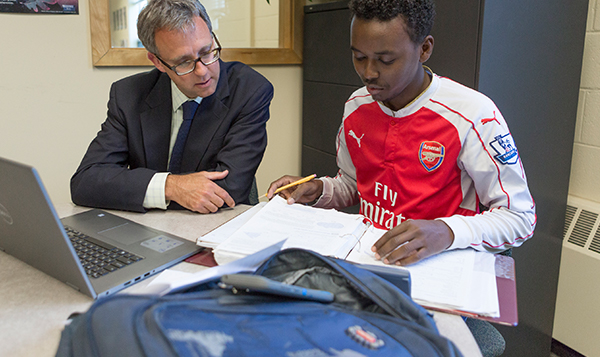Combining several student loans into one new loan or refinancing a loan can potentially result in a lower single monthly payment at a lower interest rate. It’s something to consider, but you have to make sure you understand your goals and know how to compare loans.
You might have a federal student loan, a private loan, several of each, or a combination. You’re now in repayment and there are several things you might choose to do with your loans:
You could:
- Leave your loans as they are currently.
- Combine your private and federal student loans into one loan.
- Refinance only your private student loans.
- Consolidate your federal loans in a Federal Direct Consolidation Loan.
- Do both 3 and 4.
To determine what choice is best for you, read more about private and federal student loans and their benefits below.
Refinance or Consolidate Your Loans
Have you decided that refinancing or consolidating your student loans is right for you? Find a trusted local lender through the Maine Private Education Loan Network.
Consolidation or Refinancing: What’s the Difference?
Consolidation
Student loan consolidation is the process of taking multiple student loans from one or several providers and consolidating them into a new single student loan with new terms such as the interest rate, monthly payment amount, and repayment period.
Many borrowers think that consolidating their federal loans will lower their interest rate. With federal loan consolidation (only to be used with existing federal loans), you may qualify for additional repayment and forgiveness options, but you won’t get a lower interest rate. The interest rate will be a weighted average rounded to the next ⅛% of your existing federal loans. Federal consolidation simplifies your payment process but doesn’t necessarily reduce interest rate or your debt burden.
Refinancing
Student loan refinancing is the process of replacing an existing student loan with a new loan that has new terms such as interest rate, monthly payment amount, and repayment period.
Typically, people refinance their loans to simplify monthly payments or get new repayment terms. Loan refinancing isn’t a good fit for everyone. Whether or not refinancing helps you depends on factors such as what type of loans you have, their interest rates, how long ago you took them out, and whether they came with borrower benefits or repayment options you wouldn’t want to lose.
Steps to Take Before You Consolidate or Refinance Your Student Loans
Now that you understand the difference between consolidation and refinancing, you’ll want to determine whether one or the other is right for you, prepare to refinance or consolidate, and apply for consolidation or refinancing.
Step 1: Know Your Goal
Before you decide to consolidate or refinance, it’s important to be clear about your goals. Are you hunting for lower interest rates or do you want to simplify the repayment process? Or are you hoping to consolidate multiple loans into one new loan so you have one payment instead of several?
Refinancing may improve some or all of the terms of your loan and reduce your monthly payment. However, you could end up paying more in the long run depending on the changes to your loan terms. For example, if you extend the length of the loan to reduce your monthly payment, you may pay more overall interest.
If You Have FEDERAL STUDENT LOANS
If you have federal student loans, you can consolidate them through The Federal Direct Consolidation Loan Program offered by the federal government. The program allows borrowers to combine any of their outstanding federal student loans into a single new loan. The fixed rate is based on the weighted average interest rate of the loans being consolidated, rounded to the next one-eighth of one percent, and cannot exceed 8.25 percent.
However, there is no federal refinancing. That’s because Congress sets the interest rate for federal student loans, and most of these rates are fixed by law, no matter how solid your credit or income becomes after graduation. You may be able to refinance your federal student loans into a private student loan, but you cannot refinance federal and/or private student loans into a federal loan.
If you have federal student loans, they come with some benefits that may not apply to you if you choose to refinance with a private student loan lender. Federal loan benefits and protections do not transfer to private student loans.
If You Have PRIVATE STUDENT LOANS
Private education refinance loans are variable- or fixed-interest-rate loans offered by banks, credit unions, and state agencies which allow borrowers to combine their outstanding federal and private student loans into a single new loan. The interest rate on a refinance loan is based on credit criteria set by the lender, which can include credit scores of a borrower and, if applicable, co-borrower.
If you have private student loans, they may be refinanced or consolidated with a private lender. Be aware that they may have come with certain incentives or borrower benefits. If you refinance, these benefits may no longer be guaranteed.
You can refinance your private student loans with lenders who offer private student loan refinancing, such as the Maine Private Education Loan Network Lenders.
Step 2: Things to Consider Before Consolidating or Refinancing
There are some questions you should ask yourself before you consolidate or refinance your student loans that will help you decide what is the best action for you to take.
Questions to Ask
Are your monthly payments manageable? If you have trouble meeting your monthly payments, have exhausted your deferment and forbearance options, and/or want to avoid default, consolidation or refinance may help you lower your monthly payment amount.
Are you making multiple payments? If you send payments to more than one lender every month, and want the convenience of a single monthly payment, consolidation or refinance may be right for you.
What are the interest rates on your loans? Consolidating variable-rate loans into a fixed rate or refinancing higher-interest-rate loans into a lower rate may be a reason you consider consolidation or refinance.
How much are you willing to pay over the long term? Like a home mortgage or a car loan, extending the years of repayment increases the total amount you have to repay.
How many payments do you have left on your loans? If you are close to paying off your student loans, it may not be cost effective to consolidate or extend your payments.
What benefits, if any, will you give up if you consolidate or refinance? Be sure you understand the terms of the loans you are refinancing or consolidating so you can weigh the pros and cons of taking out a new loan that may not have the same benefits as your current loans.
Step 3: Gather Your Loan Information
Collect the important information that will help you evaluate whether refinancing your existing student loan debt is the right fit for you. Use this worksheet to put all your information in one place, to help you make your decision about student loan refinancing, and then later to help you complete your loan application.
Gather the following:
- Lender name, address, and phone number
- Your current interest rates, noting whether each is a fixed or variable rate
- Balance: the total amount you owe on each loan you wish to refinance/consolidate
- Current monthly payment(s) on each of your student loans
- Months remaining in the payback of each of your loans
- Any benefits, including discounts, that initially came with your loan(s)
If You Have FEDERAL STUDENT LOANS
- You may have the option of including them in your new refinanced or consolidated loan if you choose to do so.
- Since federal student loans have many benefits not available in private student loans, refinancing or consolidating them with a private loan will eliminate those benefits — like income-based repayment options.
- To access the details on your federal loans, you can go to StudentAid.gov and click Manage Loans.
- It is your responsibility to look at each of the loans you currently have and weigh the pros and cons of including them in your new refinanced/consolidated loan.
If You Have PRIVATE STUDENT LOANS
You can find this information by logging in to your loan servicer’s website or by checking a recent statement. If you aren’t sure who the servicer is on each of your loans, you can request a free copy of your credit report at www.annualcreditreport.com. Your credit report will include any loan information, including the name of your servicer, which may be a helpful start.
Step 4: Examine Your Credit Rating
The approval and interest rate on your refinanced loan is based on the borrower’s creditworthiness. It is important that you have a clear understanding of your current credit score and/or credit history before you consider refinancing.
- Positive credit ratings could help you receive a lower interest rate if you refinance while a negative credit rating could mean a higher interest rate if you refinance.
- Many credit card companies and banks provide an estimated credit score online or on your monthly statement.
- You can obtain your free annual credit report at www.annualcreditreport.com. Credit scores are available for an additional fee.
By knowing where you stand on your creditworthiness, you can get a better idea of whether you may qualify for a refinance loan and what your new interest rate is likely to be.
Step 5: Examine the Cost of Changing the Terms of Your Loan
- You must carefully balance the shorter-term benefits of a reduced monthly payment amount and cash-flow relief with the longer-term implications of paying back more interest over the life of your loan. Typically, a shorter term yields a lower interest rate and a lower total amount paid to service the debt.
- Extending the term of the loan is not always a bad thing if the lower payment is needed for your current financial situation. If you are trying to qualify for your first mortgage, starting a business, or saving for retirement, and your current education loan payment makes your monthly debt load too high, refinancing for a longer term with a lower monthly payment may make sense for you to achieve your other goals. Also, if there are no prepayment penalties, you may be able to pay these loans off quicker and avoid some of that interest when your financial situation improves.
Step 6: Use These Tools to Help
Refinancing Calculator
Plug your loan information into this student loan refinancing calculator to see how much you could save by refinancing.
Federal Loan Consolidation Calculator
Estimate your repayment period, interest rate, and repayment schedule if you consolidate your federal student loans with this federal loan consolidation calculator.
Be sure to look into the Opportunity Maine Tax Credit that reimburses student loan payments for college graduates who live and work in Maine to see if you’re eligible.
Frequently Asked Questions
What is APR and how is it different from the interest rate?
The Annual Percentage Rate (APR) is the total cost of the loan, including the interest, fees and other charges, expressed as an annual percentage. The interest rate which is the rate you pay to borrow money, expressed as a percentage of the principal.
Should I look for a student loan with a fixed or a variable interest rate?
It depends. Consider:
Fixed-rate student loans:
- May carry a higher rate than variable-rate student loans
- Are not impacted by interest rate changes
- Provide consistent monthly payments for the life of the loan
Variable-rate student loans:
- Are impacted by interest rate changes
- Rates can change as frequently as monthly or quarterly and could change significantly over the typical repayment period of 10 to 15 years
- May actually be less expensive than a fixed-rate loan depending on the interest rate environment over the payback period
Which type of rate, fixed or variable, is right for me?
It depends. If you can pay off your student loan debt quickly, a variable-rate student loan may be a cost-saving solution if the rate is lower than available fixed rates and if the rate does not increase above the available fixed rate during the repayment period. Just remember, the longer it takes you to pay off the loan, the more opportunity there is for variable interest rates to change. You may lower the risk of your interest rate increasing by looking for a lender that caps variable rates.
A fixed-rate student loan may make it easier to plan and budget for since your monthly payment will remain the same for the life of the loan.
How are variable interest rates determined?
Variable interest rates are often tied to common indices like the Prime Rate or SOFR (Secured Overnight Financing Rate) and can change as frequently as every 30 to 90 days. For example, for loans with a rate tied to the Prime Rate, when the Prime Rate goes up, the interest rate of a variable student loan subsequently rises, and when the Prime Rate goes down, the interest rate will subsequently decrease.
Are fixed rates stable (remaining the same) through the life of the loan?
Yes. The fixed interest rate remains constant throughout the life of the loan. In a rising-interest-rate environment, this can be comforting. In a decreasing-interest-rate environment, this can be concerning.
What is the estimated time it takes from the date of online loan application to approval of the loan?
The online application takes approximately 40 to 60 minutes to complete and initial approval is often determined at that time. There may be some loans that require additional review or income verification before receiving a final approval.
Am I eligible to refinance or consolidate my student loans with the Maine Private Education Loan Network lenders?
You may be eligible to refinance or consolidate private and federal student loans (with the lenders in the Network) if you meet certain requirements such as:
- You have at least $10,000 in student loans to refinance, which can include private student loans from other lenders and/or your federal loans like Direct, PLUS, or Stafford loans.
- You are a Maine resident, graduate of a Maine high school, or attended a Maine college or university; and
- You meet credit criteria for loan approval.
What kinds of education refinance loans are available?
Federal Direct Consolidation Loans
The Federal Direct Consolidation Loan Program, offered by the federal government, allows borrowers to combine any of their outstanding federal student loans into a single new loan. The fixed rate is based on the weighted average interest rate of the loans being consolidated, rounded to the next one-eighth of one percent, and cannot exceed 8.25%.
Private Education Refinance and Consolidation Loans
Private education refinance and consolidation loans are credit-based loans offered through a bank, credit union, or state agency.
What should I do if I cannot afford to pay my student loans?
You should contact your loan servicer as soon as possible to discuss. Student loans are not dischargeable in bankruptcy and must be repaid.
Step 7: Apply for Consolidation or Refinancing
Apply to Consolidate or Refinance with a Maine Lender
You’ve thought long and hard and have come to the conclusion that refinancing and/or consolidating is right for you. What now? A great place to start is with lenders in the Maine Private Education Loan Network (Network).
The Network consists of local Maine lenders you know and trust. You may be eligible to refinance or consolidate private and federal student loans with the lenders in the Network, if you meet certain requirements.
Want to learn more? Ready to apply? Click the button below to view rates, compare student loans, and apply to refinance/consolidate with a Maine lender.
Private Loan Refinancing: Things to Consider
Before deciding whether to refinance your private education loans, it is important to understand all of the factors involved.
Private Loan Refinancing: Making the Decision
Take a look at how your loan information impacts the decision of whether to refinance.



